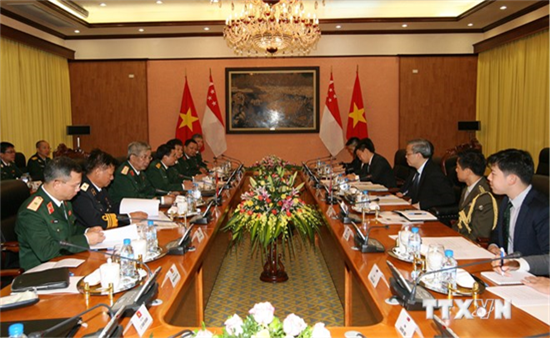Defence diplomacy, together with Party and State’s external affairs and people-to-people diplomacy, over the last years, has gained significant achievements and breakthroughs in cooperation with many partners in various fields. In the period of 2011-2013, we signed 50 cooperation agreements with 26 countries and international organizations. 45 countries have now had their attaché offices in Vietnam, and we have set up such offices in 34 countries. Mechanism of strategic dialogue and defence policies dialogue has been brought into full play, which helps effectively build trust with partners.
 |
|
Vietnam-Singapore defence policy dialogue 2014 |
The most outstanding achievement is the enhanced cooperation between Vietnam and its neighboring and regional countries, making a significant contribution to firmly defending national sovereignty and territorial integrity. Of which, the completion of international legal framework for border management, improving exchanges and cooperation with neighbors’ border guard forces for borders of stability, peace, friendship, and mutual development have been promoted and obtained practical results.
To defend national sovereignty and territory in the new situation, external affairs have been extended with higher new requirements. In order to meet those requirements, measures for defence diplomacy should be implemented synchronously, focusing on the following points:
First, Party’s guidelines on defence diplomacy should be continuously thoroughly grasped. The justice of revolutionary cause and the Party’s policies, guidelines, and strategies to safeguard the Fartherland in the new period are to be basically concretized in defence policies, foreign policies of independence and self-reliance under the motto: Vietnam is willing to be a friend and reliable partner of all countries in the international community. Building a comprehensive defence-security strategy and diplomatic strategy with guaranteed close connection among sectors’ leadership, direction, and collaboration to create synergy for defending the nation’s sovereignty and territory should be early implemented. Furthermore, it is necessary to continue bringing into play national traditions and experience in defence diplomacy to protect national sovereignty and territory; at the same time attaching great importance to creatively realizing Ho Chi Minh’s ideology and method of exercising diplomacy, upholding the principle of national independence and socialism, and the motto: “to pit the unchangeable against the changeable”, etc. Practically, the matter of national sovereignty and territory is sensitive, complicated, and closely connected with national interests and honour. Thus, to deal with this matter, there should be sound grasp and realization of Party’s guidelines on external relations, compliance with signed treaties and regulations on border management, priority given to negotiation. Accordingly, it is necessary to keep calm, be clever, uphold the principle of fighting for national interests, and be consistent in peaceful settlement of disputes, on the basis of international laws.
Second, there should be unanimous viewpoints and accurate assessment of global and regional situation, opportunities and threats to national sovereignty and territory. Sectors, branches, particularly sectors of foreign affairs, national defence and public security must exchange information, collaborate to study, analyse, strategically forecast the development of global and regional situation, current epoch, and international relations, also to counter plots of “peaceful evolution”, riots and rebellions, political-military conflicts caused by hostile forces. Defence diplomacy should proactively study and evaluate opportunities and threats to the national sovereignty and territory in comprehensive, objective, and scientific way to propose effective and appropriate measures for cooperation and struggling at the same time. To fulfil tasks, all forces in defence diplomacy need to have shared understanding and viewpoints on evaluation of the situation, a sense of responsibility towards their task, and thus creatively realizing the Party and State’s foreign policies to effectively address complex issues arising from the Fatherland’s sovereignty and territory protection.
Third, defence diplomacy must be closely associated with that of the Party and State and people-to-people exchange with a view to safeguarding national sovereignty and territorial integrity. The relevant organs, especially foreign relation divisions under the Border Guard Command, and military units in border provinces and districts need to have a thorough grasp of their situation in all fields, proactively propose contents of collaboration, particularly for the unexpected and complex circumstances. There should be enhanced collaboration among diplomatic agencies on studying to build preparatory measures to timely and effectively deal with potential risks. In handling cases relating to sovereignty and territory disputes, relevant agencies should have a thorough grasp of Party and State’s policies and guidelines on foreign affairs, work in systematic collaboration from grassroots level to higher levels, and absolutely abide by superior agencies’ rules on foreign affairs to prevent subjectivity and haste which may lead to serious consequences. Moreover, people-to-people interactions in border areas should be promoted with regular cultural discussion meetings and exchange activities with the aim of propagating our Party and State’s policies and guidelines on building borders of peace, friendship, and solidarity, to neighbouring countries’s people and local authorities, thus maintaining environment of peace, stability, and development.
Senior Lieutenant General Nguyen Chi Vinh
Member of Central Party Committee
Deputy Minister of National Defence